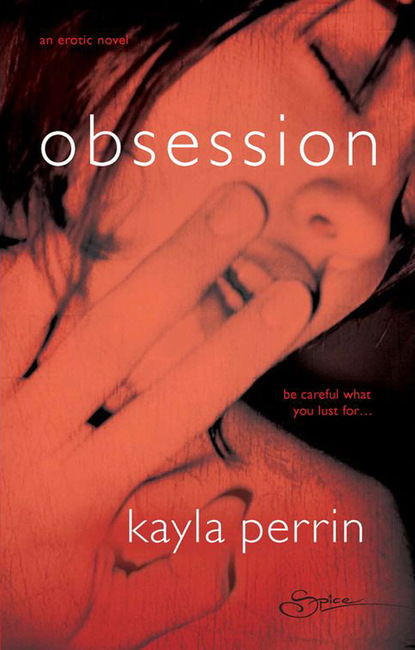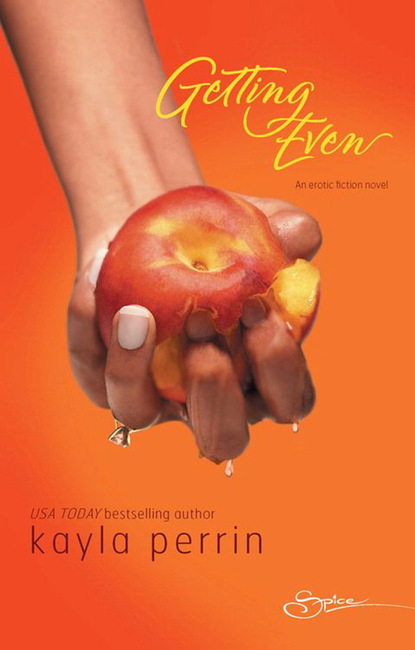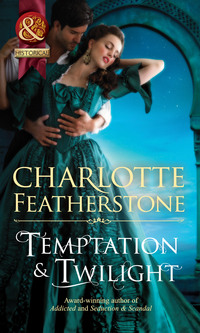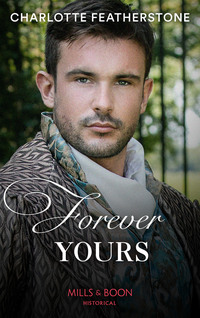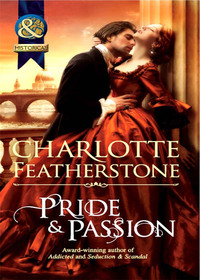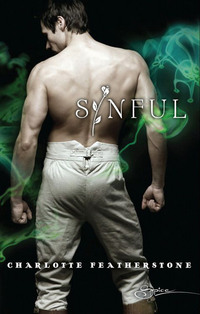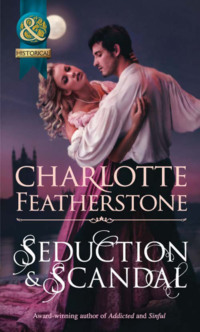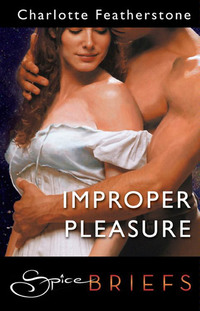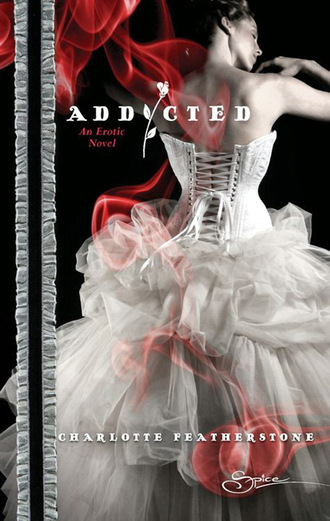
Полная версия
Addicted
“Indeed I was, Lady Anais.” He straightened away from her. “I shall check in with you tomorrow to see how you are faring.”
“Surely you do not need to call on me tomorrow?’ Tis Christmas morn, and you have a wife and child that you will not wish to leave.”
He reached for her hand, clasping it tightly in his warm one. “I shall see you tomorrow, Lady Anais. Sleep well and remember you are not to exert yourself.” He snapped shut the wooden cylinder he had used to listen to her chest. “It’s utterly amazing. Your heart sounds much stronger than it did two days ago. If you keep this up, you shall be wandering about the woods in no time.”
“Thank you, Dr. Middleton.”
“Just Robert,” he murmured as he placed his hat over his dark blond hair. “We have, after all, known each other since we were in swaddling clothes.”
“Thank you, Robert,” Anais replied, knowing he would not be happy until she did so. And truth be told, she did feel silly acting so formal around him. She had known him all her life. He was Garrett’s younger brother after all.
“Send word to The Lodge if you need me. And remember, you are not to be near drafts or the cold air. The cold makes it harder for the heart to pump the blood. Your heart doesn’t need the strain. I’m afraid you shall have to miss out on the church service this evening. Your condition is delicate, you must not take any risks.”
“Mother says that she believes you are much too young to attend me,” Anais said, laughing at him and his boyish pout.
“No doubt she puts more stock in that old physician of hers, the one whose medical books were written in the time of the Bible.”
“She’s threatened to send him to me.”
“Whatever you do, don’t let him bleed you, Anais.”
“I won’t, Robert.”
“Well, then, if that is all, I shall be on my way. The weather, it appears, has taken a turn for the worst.”
“Never know what winter will bring in Worcestershire.”
He nodded and reached for his brown pigskin bag. “It’s much the same in Edinburgh. Well, then, good night, Anais, and happy Christmas to you.”
“To you, too. Wish Margaret the same and give your daughter a kiss for me.”
“I shall,” he said, beaming a wide smile at the mention of his child. “I certainly shall. Happy Christmas, Lady Ann,” he said, inclining his head as he passed her sister.
Ann came over to the bed and sat down beside her after Dr. Middleton had closed the door. “I’m sorry. I didn’t realize he was still here. He was up here for a very long time.”
Anais shrugged and picked at the loose thread of the woolen blanket that covered her. She couldn’t help but notice how pale her fingers still looked and how her veins, so blue and cold, could be seen through her skin, as if her flesh was nothing but transparent tissue that was used for papier-mâché.
“You are improving?” Ann captured her gaze. “You must be, for you look much better than you did a month ago when you returned from France. Lud, you looked on death’s door when Lord Broughton carried you in. I vow, it was providence indeed that you met up with him in Paris, for Aunt Millie would have been in hysterics had she to deal with you alone, and in a foreign city.”
“It was very fortunate that I met up with his lordship,” she muttered, not wanting to talk about Garrett and the events that had taken place.
“Has Dr. Middleton told you what your delicate condition is? He’s mentioned it several times to Mama and Papa, but he is rather vague to its cause.”
Anais let her sister see her impatience. “I have told you, Ann, that it is nothing more than a bit of fever and malaise.”
Ann arched an intelligent, blond brow, clearly not believing what she was hearing, but letting the rebuke slide. “Mother told Father that it is most likely your womanly organs rotting away in spinsterhood that is causing your heart to fail. But father believes that you’ve caught some sort of virulent brain fever from the French.”
Anais smiled and reached for Ann’s hand. “I vow, Ann, my womanly organs are just fine. And I am not allowing that quack, Dr. Thurston, to talk Mother into believing that my condition is nothing more than hysteria caused by my woman’s parts.”
Ann chuckled. “When you say it, Anais, it sounds like such flummery. How can a woman’s organs make one hysterical?”
“They can’t. Dr. Thurston just despises women, that is all.”
“Louisa has come to me.” Ann sobered. “I thought you would want to know that your maid is concerned that your last flux lasted nearly two weeks. It was rather…er…according to Louisa, it was rather heavy.”
“For heaven’s sake,” Anais groaned, blushing all the way to her scalp. “Is nothing sacred in this house?”
“Of course not,” Ann said with a grin. “In a house filled with women, how can a subject like monthlies be kept quiet? Still, Louisa fears that it may indeed be your womanly organs that are making you ill after all.”
“The humiliation!” Anais said with mock horror. “What? Do all the maids line up in a row while they gather our monthly padding and discuss our courses? Does the entire house know when one is early, or one is late?”
“I should think the late bit would be most talked about,” Ann said, sticking out her tongue in a cheeky manner. “Imagine the gossip if one of us were to miss our monthlies. Mother would interrogate us for hours if she ever found out.”
“Mama cares only about Mama. I doubt she’d care a tuppence about something as mundane as monthlies.”
“True,” Ann agreed. “But still, I thought you would like to know. And I want to know that you are on the mend. The bleeding has stopped, hasn’t it?” Ann asked, concern once again creeping into her eyes.
“It has.”
“Father said there was nothing wrong with you that rest won’t cure. He always takes up your side, you know.”
“You are right about Father having a soft spot for me. And thank heavens for that, because if it were up to Mama, I would be in the care of Dr. Thurston, being bled every day and confined to bed with my womanly organs while he contrives to find a way to keep them from making me mad.”
“Yes,” Ann said, laughing. “Papa adores you as I know very well that you adore him. Every man you have ever met is held up to him, aren’t they? He is the pinnacle that your suitors must strive for.”
Anais felt herself blush. It was true, no matter how silly the notion sounded. Her father was a good, kind, honest man. Was it so wrong for her to desire that the man she choose to marry and commit her life to, be nothing short of the sort her father was?
“And then there is Mama,” Ann said with a groan. “She is forever making me fuss over my appearance. She is only interested in me when I am looking pretty and am dressed in frilly gowns with layers of flounces and bows. She never bothers to read my poems, and furthermore, I don’t believe she listens to me when I sing, unless of course I’m surrounded by potential beaux. Then she uses it to her advantage to inform everyone, most embarrassingly, I might add, what a wonderful wife I shall make. I vow, Mama never has a substantial thought in her head. She never thinks of anything other than fashion and her toilette. How could father have married such a shallow person?”
“Love is blind, I suppose.” Anais thought of how she had been blinded by love. Love had stopped her from seeing what Lindsay was truly like. Naiveté had prevented her from realizing that Rebecca was not truly her dearest friend. She had been so blind to many things this past year.
“Anais,” Ann asked, her tone suddenly somber. “I wish to know if anything happened between you and Lindsay. You both left Bewdley so suddenly. I never heard a word about you going off to France with Aunt Millie and her companion, Jane. And suddenly, you were gone. Then Lindsay arrived and I heard him yelling downstairs in Papa’s study, demanding to know where you were being kept. He was distraught. I could not help but think his choice of words was rather bizarre.”
“Perhaps you misinterpreted them.”
Her sister frowned. “I did not. And do not pretend to believe that you don’t think Lindsay’s sudden disappearance is not odd. I don’t believe that he just poof—” Ann puffed between her lips as she waved her hand as if she held a magic wand in her fingers “—he just disappeared into thin air without a word to anyone. Not even his mother, Lady Weatherby, knows precisely where he is. He has been gone over ten months, Anais, with no news of him. Are you not concerned?”
“I’m tired, Ann.” She was feeling weak and fatigued, but most of all she did not want to talk about Lindsay and what had happened between them the night of the masquerade ball. She had told no one, not her father, and most certainly not her mother. She had to divulge a few of the details to Aunt Millie. Aunt Millie’s companion, Jane, knew a bit more than her aunt, but Anais had convoluted the truth to suit her needs. The only person who knew the full truth was Garrett, and he had been remarkably supportive, not to mention silent.
“I’m very disappointed in Lord Raeburn,” Ann said, stroking Anais’s hand with her fingertips. “I thought for certain he would propose to you. How wrong I was.”
“It’s all right, dearest,” Anais said, trying to smile for her sister’s benefit. “It wasn’t meant to be.”
“But you loved him, Anais.”
“In truth, it would not have been a sound alliance.”
Her sister shot her a dubious look. “And an alliance with Lord Broughton would be more sound, then?”
“Ann,” she warned. “I am not talking about such things with you.”
“I’m fifteen now,” she wailed, “and Squire Wilton’s son kissed me beneath the Maypole. I’m a woman, Anais. I know about such things as love and marriage.”
“Really? Then you are much more educated than I, for I understand none of it. Now, off to church you go. I think I hear Mama calling your name.”
“What of Lord Broughton, Anais, are you going to marry him?”
“Garrett is a friend, Ann. A very dear friend.”
“Just like Lindsay was your very dear friend?”
Anais looked toward the window, to the black night beyond and the white snow that fell in a straight, heavy line. “Lindsay was a dear friend. But that was before.”
“I’m sorry that Lindsay ran off instead of proposing to you. I would have liked to have him for a brother-in-law. He is much more sporting than Lord Broughton.”
“Lord Broughton is a very kind man. He is very loving, very forgiving.”
“And what has Lord Broughton to forgive you for?” Ann asked, immediately pouncing on the little slip.
“For not marrying him despite—” Anais looked away and brushed a small tear that escaped unchecked from her eye. She did not finish her thought. Could not finish it, despite the very great need she had to confide in someone. She felt so alone, so empty inside. But then, she had made her own choices and the consequences were hers alone to live with.
“I hope someday you shall be able to tell me the truth of what happened between you and Lord Broughton in Paris, Anais. Perhaps you have convinced Mama and Papa that this mysterious illness of yours is nothing but a trifling fever, but you have not fooled me. I would hate to think you could not share confidences with your own sister.”
“Confidences can be such burdens, Ann. I contracted my illness while traveling abroad. Lord Broughton returned me home to convalesce, there is nothing else to say.”
Ann’s blue eyes swept along the covers that shielded Anais’s form. Anais could not help but draw her knees up farther, hiding deeper beneath the blanket. “I suppose time will tell us, won’t it?” Ann said with a sad wistfulness. “Good night, Anais.”
“Good night, Ann.”
Her sister smiled and let herself out. Sighing heavily, Anais looked about her room, feeling tired and drained. Her body was tired, her mind and the worries that constantly plagued her further drained her of what little strength she still possessed. She wondered if she would ever be free of the worries she harbored. Perhaps it was her penance to live every day in fear that her secret would be found out and exposed to the world.
The clopping of horse hooves on the cobble lane outside broke through her thoughts and she slipped out of bed, watching as her sister and mother were handed into the carriage by a footman dressed in his blue-and-silver livery. Where was her papa? she wondered. Perhaps he was already in the carriage. But it was not like him to not wait for the ladies of the house to enter the carriage first.
The carriage door slammed shut and within seconds, the four white horses were in motion, carrying her family the short ride into the village and the Christmas Eve church service.
Reaching for the book that sat atop her bedside table, Anais reached for it only to have it slip from her fingers and land with a loud crack against the floor. She startled in surprise. It was a loud, ringing sound for so slim a volume, and the resonance echoed throughout her room. The echo, she noticed, was followed by a peculiar thudding on the stairs below.
Strange. Who could be running up the stairs in such an undignified manner? Shrugging, she bent at the waist to retrieve the book and straightened in horror. The almost overpowering scent of smoke wafted up between the floorboards and she ran to the door, breathless despite the minute exertion. Throwing open her chamber door, Anais saw that the hallway was engulfed in fire. The staircase, that only minutes before Ann had descended, was swallowed in black smoke and orange flames. Shutting the door as the wind came from below and licked the flames into a soaring giant tower, Anais scrambled to her dressing room, praying she could escape down the stairs before the fire consumed that portion of the staircase. But as she reached for the latch, she realized it was locked and the key missing. Squelching the panic that arose in her breast, Anais fought to clear her head of the dizziness and the burning sensation in her chest. She was trapped.
The house, nearly two centuries old and built entirely of wood and plaster, would be engulfed by fire in no time. She did not have minutes to waste in panic.
Anais looked to the window and ran to it, flinging open the sash and ignoring the bitterly cold air that rushed in. Tearing the velvet draperies from the wooden rods, she ignored the heaviness in her chest and went to work tying them together before she reached for her blankets and drew the coverlet from the bed.
There was no recourse left, the window was her only means of escape.
5

The wind howled through the forest and down the mountains, only to whirl around the lumbering conveyance. The chill air somehow found a way through the tight seams of the carriage frame, plummeting the temperature inside so that the interior felt like an icebox. Burying his chin into the folded depths of his greatcoat, Lindsay felt another chill race down his spine.
“Damn cold,” he grunted, burrowing deeper into the warm Yorkshire wool of his coat. What bloody timing to arrive back in England during a snowstorm.
As the rhythmic rocking of the carriage continued, Lindsay fought to stay awake, but soon his eyes grew heavy until it was impossible to hold them open. Within minutes he was dreaming. Dreaming of dry, arid heat and the scent of Arabian spices that sifted through the waving branches of cypress trees.
In his dream he was back in Constantinople, where the saffron-colored sun hung heavy on the azure horizon, illuminating the cobalt and gilt tiles of the Islamic columns of the Kapali Çarsi. The sun burned hot on his cheeks. The scarf he used to protect his head from the heat rippled in the breeze as the salt-scented air rolled in from the Sea of Marmara. That salty, spicy breeze was the only reprieve from the scorching heat of the midday sun and the sea of humanity that swarmed inside the covered bazaar.
Inside the Kapali Çarsi, viziers and pashas smoked their hookahs while their slaves and attendants bartered for goods for their richly furnished homes. It had been there, in Constantinople’s covered bazaar, that Lindsay and his traveling companion, Lord Wallingford, found themselves meandering through the hundreds of stalls that sold everything from spices and nuts to hashish and beautiful women who were bought by rich men as new acquisitions for their harems.
Constantinople’s voluptuous exoticness was so different from his genteel England. He was so very far removed from the glittering ton and the fancy town houses in Mayfair. Far away from his responsibilities to his family and the estates in Worcestershire. Yet Constantinople had not been far enough away from the reaches of his past. He still remembered how Anais had fled from him the night she’d discovered him in the hall with her best friend. No physical distance could make him forget that strangled cry of shock and hurt, nor the distraught look in her eyes.
Now semiawake, he struggled to find his way back to his dream—to a time where nothing had mattered but the warm, lazy days spent in decadence. To the days when the hookah and a beautiful concubine had been all he needed to wile away the hours and deaden the pain of his failure.
But damn him, the dream would not return. It remained elusive and he was faced once more with remembering how Anais had seemed to vanish into thin air after she left the Torrington masquerade. He had looked everywhere for her, but she had evaded his pursuit, denying him the chance to explain that he had not set out to seduce her friend or to destroy her faith in him.
After searching throughout England he’d traveled across the channel to France. He had learned from Anais’s mother that she had gone abroad with her aunt—a trip, Lady Darnby had told him, that had been planned for some time. But he knew better. She’d gone to France in order to be free of him.
He had immediately set out for the continent, but hadn’t been able to locate her in Paris. It was then that Wallingford grew frustrated with him and his obsession with finding Anais. After weeks of fruitlessly searching Paris, Lindsay had allowed Wallingford to persuade him into accompanying him to Constantinople where Lindsay had been seduced, not by beautiful women, but by the allure of opium. Opium, that heavenly demon.
The carriage swayed sharply, pitching to the right. Lindsay found himself fully awakened, and he shook his head free of the memory of his time in Constantinople, as well as the bitter memories of Anais.
“You were dreaming,” Wallingford said, tossing him a fur for his lap.
The temperature had dropped again and the carriage, despite its cushioned silk and thick blinds, could not keep out the chill from the violent winds.
“I was remembering how warm the breeze was when it blew in from the Bosphorus. Perhaps we should not have left the warmth of Constantinople,” Lindsay muttered, lifting up the blind and seeing nothing but the blinding whirl of snow outside the window. “I had almost forgotten how damn cold England gets in December. Although, this amount of snow is quite rare so early in the season.”
Wallingford nodded as he puffed on his cheroot. “It is bloody cold. But three months ago we were not thinking of winter when we left Turkey. We were thinking of other things—like the beauty of the woods in the fall. The sound of the wind howling through the forest as it blows from atop the Malvern Hills. We had had enough of traveling, had we not? We were anxious to see England again.”
“Indeed.” But had he not experienced that dream of Anais all those months ago, he might still be in Constantinople, wasting away his days in lavish Eastern decadence. He had been lost for days at a time, the opium his only companion in a world of silk veils and velvet pillows. Where he had only had a taste for opium before, he now had a consuming hunger.
“Sir,” one of the footmen called, rapping his fist against the back of the carriage. “We need to stop, milord.”
With a tap of his walking stick against the trap door, Lindsay signaled for the coachman to bring the team to a stop. As the six grays came to a prancing halt, Lindsay threw open the door and covered his face with his arm as snow, wild and angry, gusted inside the carriage.
Lindsay could not help but notice how red-cheeked and shivering the footman was, despite the beaver hat and numerous layers of thick woolen capes. “The stallion is rearing in the box carriage, milord. Jenkins says that the animal has begun to suffer from the cold.”
“Not acclimated yet,” Lindsay called over his shoulder to Wallingford. “I’ll ride him the rest of the way. That should warm him up.”
“Bloody fool,” Wallingford yelled after him after Lindsay disembarked from the carriage. “You’ll get yourself killed riding that animal in this weather.”
“I spent a fortune on him. I’ll be damned if I allow him to die from the cold. He’s going to stud my stables and he can’t very well perform when he’s frozen, can he?”
“Damn it, Raeburn,” Wallingford grunted as he tossed his cheroot into a drift of snow. “You know I won’t let you go alone. Not in this weather. Bloody hell, man.”
Lindsay tossed his friend a smile. “Come, it will be like old times, when we were neck-or-nothing youths galloping at breakneck speeds down the mountainside.”
“Our bones were not so easily broken in our youth,” Wallingford grumbled as he raised the collar of his greatcoat to protect his face from the biting wind. “Nor were our heads, for that matter.”
“You sound like Broughton when he used to chastise us for our foolish recklessness.”
“I’m coming to believe that our dear friend was the more intelligent of the three.”
“Come,” Lindsay said, not wanting to think of how he had betrayed Broughton, as well as Anais. Instead, he stalked to the box carriage to where his prized Arabian stallion was snorting and stomping.
“Lead on, Raeburn,” Wallingford said, following in Lindsay’s wake. “And if we are so fortunate to make it home alive, the first to enter the stables may buy the other a warm pint of cider and a hot woman.”
Lindsay gained the stallion’s saddle and took up the reins, turning the Arabian in the other direction. Through the snow, he ran the animal as safely as he could while ignoring the biting wind. On instinct, Lindsay guided the horse down a path he had followed countless times in his lifetime.
As the familiar sites came into view, Lindsay slowed the stallion as it pranced along the icy path that overlooked the town of Bewdley nestled snugly in the vale below them. Ice pallets floated aimlessly atop the black waters of the Severn River, reminding Lindsay of the paintings he had once seen of the remnants of an iceberg after it had crumbled into the sea.
Tossing its sleek black head, the Arabian’s billowing breaths misted gray and evaporated amongst the snowflakes that were circling about them. Tightening the reins, Lindsay settled the rearing animal before casting his gaze to the roof of St. Ann’s Church that dominated the view of the town.
Below the ridge lay the sleepy village he had called home since birth. But tonight, the quiet little village of Bewdley was coming alive. Its residents were strolling down the cobbled streets, candles in hand as they made their pilgrimage to church. To the west of the town center, huddled in the valley where a small tributary broke away from the Severn and formed a creek, lay the first of four prominent estates that anchored Bewdley’s aristocratic society. Wallingford’s family estate bordered the forest. Broughton’s was to the east and only minutes down the ridge. His own home, Eden Park, rested on the other side of the bridge. And directly below him lay Anais’s home, which he had not seen in nearly a year.
Scouring the Jacobean-style mansion from high above the valley, Lindsay blinked back the snowflakes that landed on his eyelashes. The earthy, acrid smell of wood burning in the cold air drifted up to meet him and he inhaled the scent, so familiar to him, yet so long since he’d been home to smell its aroma.



